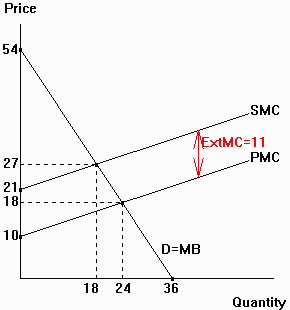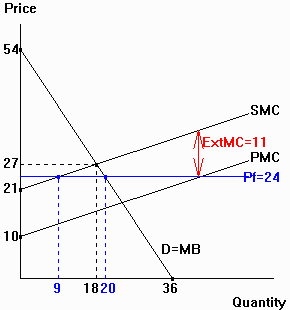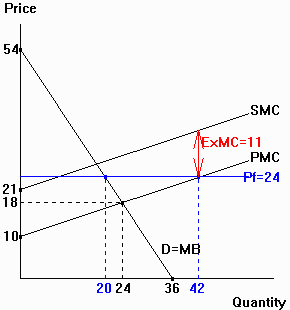1. Pretrade




|
Monday, March 26, 2012 |
Environmental regulations and trade case study
The situation: (The following information is taken from a true story; only the names have been changed.) The information describes air quality regulation in two democracies, West and East. West and East are about 1,400 miles apart, so the air pollution for each is local in nature--it does not float over to cause any pollution problems for its trading partner.
1. Environmental regulation in West, a democracy with 1999 per capita income of $29,910:
Back in the 1950s, black
soot and foul fumes poured into the air above West as oil companies produced the gasoline
that fueled West's cars. Half a century and billions of dollars worth of smog controls
later, West's 14 oil refineries are among the most heavily regulated industries in the
nation, slashing their air pollutants to a fraction of what they were.
In the late 1970s, West's oil companies had to install
multimillion-dollar scrubbers to eliminate clouds of sulfur oxides, which smell like
rotten eggs and can cause breathing problems. Also, 12 years ago, refineries in West spent
more than $ 400 million retrofitting industrial boilers and heaters to reduce nitrogen
oxide fumes. In all, refineries in West must follow about 30 specific smog-control rules.
The environmental manager of West Petroleum Assn. said that that has required engineering
changes to every major aspect of the massive plants. Each West refinery is "about 10
times cleaner" than it was 15 years ago, the manager said. From 1975 to 1997, major
air pollutants in West's refineries declined at least 60% to 85%.
West's cleaner air has, however, carried a steep price tag. Smog
rules are one reason gasoline costs more to produce in West, and economists have found
that several small refineries have shut down. Each refinery spends $ 3 million for every
new smog rule and $ 5 million when an existing rule is strengthened. West industries
increased their spending rate on smog controls in the 1980s at a rate 10 times higher than
the average elsewhere, the economists said. West's industries "faced much faster
increases in smog abatement costs than comparable plants in places essentially free of
local air quality regulation," the economists reported.
2. Environmental regulation in East, a democracy with 1999 per capita income of $26,858:
In East, which last year
suffered from high levels of smog, refineries have made little progress. East's smog has
worsened in recent years, and industrial plants still spew large volumes of pollutants.
East's refineries are 10 to 20 years behind West's refineries in controlling their
pollution, and they have done nothing to clean the sulfur up.
Although proven technologies to control emissions have been available
for decades, a plant in East emits as much as five times more smog-forming pollutants than
a comparable-sized one in West. Unlike West, where cars and trucks are the main culprits,
more than half of East's pollution comes from industry, led by its giant oil refineries.
In 1998, for each barrel of crude oil processed, East refineries emitted three times more
pollution-forming gases than West refineries. West's air-quality regulators "would
get run out of the country here," said one East oil company manager who asked to
remain unidentified. "East is still a place in which the issues of growth and
development are not part of the political milieu. They don't want to do anything that
could be construed as anti-growth."
Oil refineries in East are only starting now to reduce their air
pollution under a new law, said an air quality official at the East resource commission.
However, East's legislation "grandfathered" large industrial plants, granting
them permission to continue emitting their previous levels of pollution. East proposes to
rely on a voluntary approach, criticized by environmentalists, but consistent with the
overall view of regulation by East's prime minister. "This country is entering a new
era of environmental policy. An era of cooperation, not coercion, of responsibility, not
heavy-handed regulation," he said in a speech last fall. An official of East resource
commission said the country's voluntary program will ease the way for aging plants, which
need massive smog retrofits at a "shocking cost that could put these companies out of
business," he said.
The question: From West's perspective, what is best for its welfare in dealing with East, free trade in gasoline, or trade restrictions? Why?
Trade and the environment: the case of domestic pollution
| West: does enforce environmental regulations | East: does not enforce environmental regulations |
1. Pretrade |
|
| Case 1a: The market with regulations | Case 1b: The market without regulations |
 |
 |
| 2. Trade and the environment | |
| Case 2a: Trade gains with environmental regulations | Case 2b: Trade gains without environmental regulations |
 |
 |